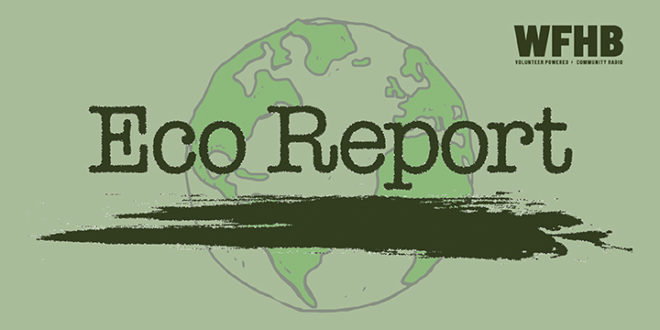Podcast: Play in new window | Download (Duration: 29:00 — 20.2MB)
HEADLINES
As the effects of the climate crisis ravage the West with severe drought and persistent wildfires, Indiana will become accustomed to more frequent bouts of severe weather.
—Norm Holy
The Indiana Department of Natural Resources is investigating reports of sick and dying songbirds in five Indiana counties. The agency said several species of songbirds in Monroe, Clark, Jefferson, LaGrange and Lake counties showed neurological signs of illness, eye swelling and crusty discharge.
—Norm Holy
Veterans are dying of cancer after being exposed to burn pits during their military service. All the many kinds of trash soldiers generate go into burn pits for disposal—metals, plastics, electronics, medical waste, uniforms, human waste, chemicals, paint, munitions and petroleum products.
—Linda Greene
Yellowstone National Park is getting hotter, according to U.S. Geological Survey, or USGS, scientist Steve Hostetler. The trend toward a warmer, drier climate described in a study will likely affect ecosystems in the region and the communities that depend on them.
—Norm Holy
The Canadian pipeline company that had long sought to build the Keystone XL pipeline announced June 9 that it had terminated the embattled project, which would have carried petroleum from Canadian tar sands to Nebraska.
—Norm Holy
The Chicago Tribune reports Illinois, one of the nation’s largest producers of coal, is on the verge of becoming the first Midwest state to ban energy companies from burning the lung-damaging, climate-changing fossil fuel to generate electricity. The end of gas-fired power might not be far behind.
—Norm Holy
A federal judge in Louisiana has blocked the Biden administration’s suspension of new oil and gas leases on federal lands and waters, in the first major legal roadblock for President Biden’s quest to cut fossil fuel pollution and conserve public lands.
—Norm Holy
The New York Times reports that the Biden administration plans to restore environmental protections to Tongass National Forest in Alaska, one of the world’s largest intact temperate rainforests, that had been stripped away by former President Donald J. Trump.
—Norm Holy
The Martabe Gold Mine, owned by a British company, has been operating in orangutan territory, and satellite images have just documented a new expansion of the mine into the heart of that territory.
—Linda Greene
President Biden has suspended all oil leases in Alaska’s Arctic National Wildlife Refuge. Scientists have made it abundantly clear that every ounce of Arctic oil and gas must remain in the ground if we’re to avoid the most catastrophic effects of the climate emergency.
—Linda Greene
Only twenty companies are responsible for creating 55% of global plastic waste. Further, only a hundred companies are responsible for over 90% of the waste.
—Linda Greene
YaleEnvironment360 has reported on armies of bugs chewing through global forests. First, mountain pine beetles devastated lodgepole and ponderosa pine trees across western North America. Then came spruce beetles, which have targeted high-elevation Engelmann spruce, spreading from New Mexico into Colorado and beyond.
—Norm Holy
Adani Enterprises has proposed to convert coal dug from its highly contested Carmichael mine in Australia into polyvinyl chloride plastic, more commonly known as PVC or vinyl, in a four-billion-dollar plant in India. PVC is the dirtiest type of plastic on Earth.
—Linda Greene
The UN World Heritage Committee recently proposed to downgrade the Great Barrier Reef’s World Heritage status due to climate change, to the surprise and dismay of the Australian government.
—Norm Holy
An international panel of 12 legal experts has drafted an official definition of ecocide this week after months of deliberation. The definition was released with a proposed law that would be the fifth crime prosecuted by the International Criminal Court if enacted.
—Norm Holy
CALENDAR
| And now for our events calendar.
Join Naturalist Emilie at Spring Mill State Park on Friday, July 2nd, from 10 to 11:40 am for a rugged hike on Trail 3. Hike three Nature Preserves and learn about the caves, old growth forest and wildlife along the way. The hike is a rugged 2.5 miles long. Meet at the Twin Caves parking lot. |
| Have you ever wondered what the different types of clouds mean? The Paynetown State Recreation Area at Monroe Lake is having a Cloud Keepers class on Saturday, July 3rd from 2 to 3:30 pm. Drop by the Swimming Beach to learn how to predict the weather by looking at the clouds. A guide pamphlet will be available for you to take home. |
| Enjoy a Creek Stomp on a hot 4th of July Day at McCormick’s Creek State Park from 1 to 2:30 pm. Get your feet wet as you explore Echo Canyon and learn how McCormick’s Creek got its name. See what fascinating creatures call the creek home. Meet Naturalist Sarah at the Canyon Inn. |
| The popular Flora Field Day is taking place on Tuesday, July 6th, from 9:30 to 11:30 am at the Fairfax State Recreation Area at Monroe Lake. It’s your opportunity to work on your flora identification skills plus practice with a naturalist! There is emphasis on proper use and application of an ID Key, which opens the door to identifying thousands of species. Bring a copy of Newcomb’s Wildflower Guide, if you have one; insect repellent; hat and sunglasses; and bottled water. Sign up by July 3rd at http://bit.ly/florafield-jul2021.
There will be a Mushroom Foray at the Griffy Lake Nature Preserve on Sunday, July 11th, from 1 to 2:30 pm. Find out where to search for and how to prepare the many edible wild mushrooms our environment provides. The program begins with a brief introduction to common and easy-to-identify edible mushrooms, followed by a hike to search for edible fungi. Dress for the weather, and meet at the Boat House. Register at Bloomington.IN.gov/parks. |
 WFHB Bloomington Community Radio
WFHB Bloomington Community Radio


